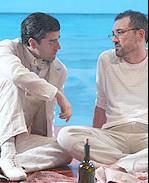SEARCH
REVIEWS
FEATURES
NEWS
Etcetera and
Short Term Listings
LISTINGS
Broadway
Off-Broadway
NYC Restaurants
BOOKS and CDs
OTHER PLACES
Berkshires
London
California
DC
Philadelphia
Elsewhere
QUOTES
On TKTS
PLAYWRIGHTS' ALBUMS
LETTERS TO EDITOR
FILM
LINKS
MISCELLANEOUS
Free Updates
Masthead
Writing for Us
A CurtainUp Review
Beauty of the Father
By Elyse Sommer
| Being an artist, that's like being a father to many people. ---Frederico Garcia Lorca, or rather his ghost, who has become an ever present adviser and commentator to Emiliano, an artist with a troubled personal life. |
 Oscar Isaacs & Ritchie Costerin Beauty of the Father Oscar Isaacs & Ritchie Costerin Beauty of the Father
(Photo: Joan Marcus) |
The ghost who haunts painter Emiliano's home and studio on the Mediterranian sea is no ordinary ghost, but Spanish literary legend Frederico Garcia Lorca. His presence can be attributed to the fact that Lorca has undoubtedly been much on Emiliano's mind since the large painting resting on an easel, its back to the audience, depicts Lorca's murder during the Spanish Civil War. It's as if the figure of the martyred Lorca has risen from that canvas to narrate Cruz's story and intermittently advise, comfort and provoke the troubled Emiliano.
While the problems that comprise the plot smack of a soap opera that goes from confrontation to confrontation between the characters without any real resolution to their conflicts or any in-depth revelations about what makes them tick, Beauty of the Father is nevertheless eminently watchable. Michael Greif and his design team have given the play a production that matches the sumptuous language and imbues everything with an aura that seduces you into a sense that its beauty goes deeper than its lush exterior and that there's real relevance to the assorted bits of symbolism (including a rifle that could easily be imprinted with the name Chekhov). Mark Wendland's blue seascape is gorgeous whether a tranquil blue or, as aided by James F. Ingalls, it erupts on occasion into a Hellish red.
The actors too play their parts as if Cruz had written them with more sympathy and depth, especially the always satisfying Priscilla Lopez as the mistress Emiliano plans to marry as soon as she can divorce young Karim (an impressive Off-Broadway debut by the handsome, matchstick thin Pedro Pascal) -- a sham marriage to enable the young perfume maker to become a Spanish citizen and sustain the menage à trois. As a woman who's learned to be open-minded about her relationships, Lopez handily deliver both the overcooked as well as the occasionally genuinely funny tropes (as an example of the former, there's her likening her love for Emiliano to "a light that is full of respect for life" -- and to illustrate the latter she declares "For me sex is like a summer house I close up for the season").
But as the real characters are overshadowed by the fantasy figure of the ghost, so Oscar Isaac's portrayal of Lorca dominates the two hours. Dressed in a white linen suit (just one of Miranda Hoffman's aptly beautiful costumes), Isaac is a cross between Tennessee Williams, Tom Woolf, and the title characters in Dirty Rotten Scoundrels. His hair and features are somewhat reminiscent of the real Lorca as well as Oscar Wilde, especially given the wit and wisdom he spouts -- including warnings that Emiliano's relationship with Karim is likely to turn messy, a danger not unknown to either Wilde or Lorca.
As Cruz's Pulitzer-prize winning Anna In the Tropics dished up a fascinating slice of history about the lectors hired to read to the workers in the old Cuban cigar factories, so the bits of Spanish history and custom that are integrated into Beauty of the Father add to the pleasure of watching it. A case in point is a particularly lovely scene at the beginning of the second act in which Emiliano's little menage is gathered at the beach for picnic to celebrate a Spanish holiday when it's customary to burn things no longer useful which in Paquita's case includes certain dreams and men who did her wrong. The vision of the picnickers shown in silhouette before settling down to enjoy wine and sausages is so magical that you tend not to question why Lorca heretofore visible only to Emiliano, typical of such fantasy character, suddenly becomes visible to everyone.
Being a devotee of magic realism will help to overlook Beauty of the Father's weaknesses. However, when the last gorgeous scene has played out, it's hard not to feel let down that Michael Greif's staging and the playwright's extravagant language aren't bolstered by a really powerful drama to stay with you long after you leave the theater.
| BEAUTY OF THE FATHER Playwright: Nilo Cruz Directed by Michael Greif Cast: Ritchie Coster (Emiliano), Oscar Isaac (Federico Garcia Lorca), Priscilla Lopez (Paquita), Pedro Pascal (Karim), and Elizabeth Rodriguez (Marina) Set Design: Mark Wendland Costume Design: Miranda Hoffman Lighting Design: Jim Ingalls Sound Design: Darron L. West Dialect Coach: Deborah Hecht Running time: 1 hour and 50 minutes, including an intermission MTC at New York City Center's Stage II, 131 West 55th Street (212) 581-1212.www.ManhattanTheatreClub.com From 12/15/05 to 2/19/06; opening 1/10/06 Tuesday through Sunday at 7:30 PM, with matinees on Saturday and Sunday at 2:30 PM. Tickets: $48; $25, students Reviewed by Elyse Sommer based on January 14th matinee performance |

Easy-on-the budget super gift for yourself and your musical loving friends. Tons of gorgeous pictures.

6, 500 Comparative Phrases including 800 Shakespearean Metaphors by our editor.
Click image to buy.
Go here for details and larger image.




